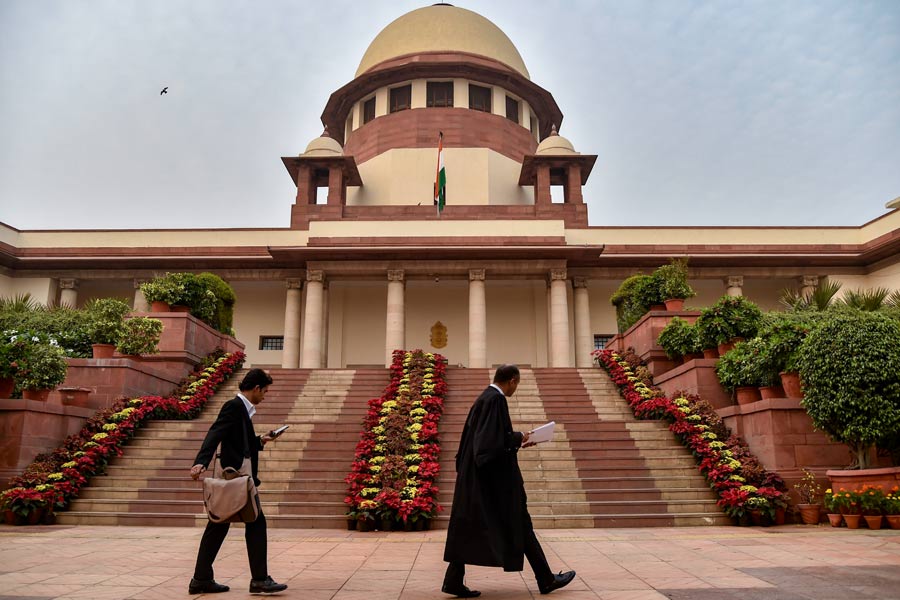The Supreme Court on Monday held that the timeline stipulated for recommendation and grant of prosecution sanction under the anti-terror law UAPA has to be strictly adhered to as without such limitations, power will enter the realm of the “unbridled” which is “antithetical to a democratic society”.
Rules 3 and 4 of the UAPA Rules provide a seven-day period within which the authority concerned has to make its recommendation on the basis of materials gathered by the investigating officer and a further seven days period for the government to grant sanction for prosecution, having considered the report of the authority, the top court said and asserted that timeline in such cases are "unquestionably important".
A bench of Justices CT Ravikumar and Sanjay Karol ruled that the validity of prosecution sanction under the Unlawful Activities (Prevention) Act (UAPA) should be challenged at the earliest instance available before the trial court.
“There have to be certain limitations within which administrative authorities of the Government can exercise their powers.
"Without such limitations, power will enter the realm of the unbridled, which needless to state is antithetical to a democratic society. Timelines in such cases, serve as essential aspects of checks and balances and of course, are unquestionably important,” the bench said.
It added the legislative intent is clear and the rules made by virtue of statutory powers prescribe both a mandate and a time limit.
“The same has to be followed. Here itself we may clarify that the conclusion arrived at by us in respect of the strict adherence to the timeline mentioned in Rules 3 & 4 of the 2008, (UAPA) Rules shall not affect any decision of the authorities where the same may or may not have been followed as on date of this judgment. For ample clarity, it is stated that the observations made in this judgment shall apply prospectively,” the bench said in its 63-page verdict.
The verdict came on an appeal of one Fuleshwar Gope, who is alleged to be a member of the People’s Liberation Front of India (PLFI), a splinter group of CPI (Maoist) in Jharkhand.
He has challenged his Jharkhand High Court’s order dismissing his plea against the grant of prosecution sanction under the UAPA and the subsequent proceedings.
The apex court bench said that if prosecution sanction is challenged at an appellate stage it would be for the person raising the challenge to justify the reasons for bringing the same at a belated stage.
The reasons challenging prosecution sanction need to be considered independently to ensure that there is no misuse of the right of challenge with the aim to stall or delay proceedings.
“If it is raised belatedly, however, the Court seized of the matter must consider the reasons for the delay prior to delving into the merits of such objections.
"This we may say so for the reason that belated challenges on these grounds cannot be allowed to act as roadblocks in trial or cannot be used as weapons in shirking away from convictions arising out of otherwise validly conducted prosecutions and trials,” the top court said.
The bench said as UAPA is a penal legislation, strict construction must be accorded to it.
“Timelines imposed by way of statutory Rules are a way to keep a check on executive power which is a necessary position to protect the rights of accused persons. Independent review by both the authority recommending sanction and the authority granting sanction, are necessary aspects of compliance with Section 45 of the UAPA,” it said.
The top court observed that the grant or non-grant of sanction under the UAPA sets in motion the machinery of strict law and given its severity, the effect it has on the accused is not only within the realm of law but also drastically affects social and personal life.
“It is only after the authority, having been handed this task, is of the considered view that sanction can be granted, should it be so done. The procedures qua sanctions provided in such legislations are meant to be followed strictly, to the letter more so to the spirit.
"Even the slightest of variation from the written word may render the proceedings arising therefrom to be cast in doubt,” it said.
The bench said that Gope can raise his arguments on the application of mind for the prosecution of sanction during the course of trial and refused to interfere with the high court’s order.
“In that view of the matter, we have no hesitation in holding that while we recognise the treasured right of an accused to avail all remedies available to him under law, in ordinary circumstances challenge to sanction under UAPA should be raised at the earliest possible opportunity so as to enable the trial court to determine the question, for its competence to proceed further and the basis on which any other proceeding on the appellate side would depend on the answer to this question,” the bench said.
Except for the headline, this story has not been edited by The Telegraph Online staff and has been published from a syndicated feed.











